
Author: rgsind

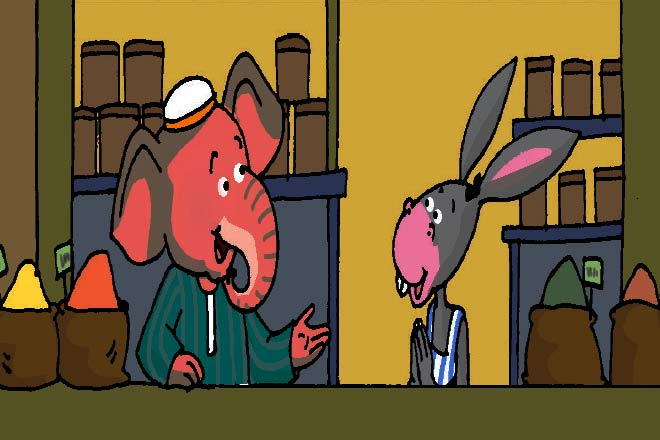
Damru & Almonds

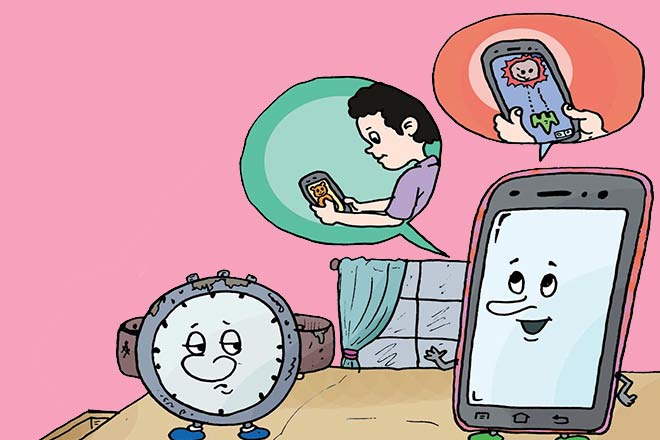
A Change in Time
Karan came back from the shop after buying a new cover for his mobile. He placed his mobile on the table and went to his room to study. Sensing that no one was around, Karan’s wristwatch slowly peeped out of the draw. It saw the mobile admiring its new cover.
“Hello! Has Karan bought a new cover for you again?” asked the wristwatch.
“Yes! Don’t you just love the colour?” said the mobile. “And don’t be jealous that you don’t get such special treatment. It’s just that I am more useful to him than you are.”
“I was Karan’s favourite before you came into his life as a gift from his uncle. From that day on, he has forgotten all about me,” moaned the wristwatch.
“I still remember how he would tie me around his wrist and take me along wherever he went. He was so proud of me. He would even show me off to his friends,” it remembered. “But look at me now—I am covered in dust and my battery has become weak. I think I will stop working after a few days.”
“Why would Karan want you when you are not useful to him anymore?” asked the mobile phone.
“That’s not true. When Karan was younger, I was used to teaching him to tell the time. His parents and teachers pointed to me to teach him punctuality, to be on time for school and to keep up with his schedule. Through me, he learnt that time once lost cannot be regained. So, he would be very careful about how he spent his time. But why doesn’t he tie me around his wrist anymore?” wondered the watch.
“That’s because I do a lot more things for him, besides just telling the time. I can talk, take photos and give him directions to wherever he wants to go. They call me a smartphone for a reason!” boasted the mobile. “So, now that I am here, you are not needed.”
On hearing this, the watch became sad. “Perhaps, the mobile is right. Karan doesn’t need me anymore,” it thought gloomily.
A few days later, Karan’s exams began. He returned home quite upset after his first exam.
“How was the exam, Karan? Was the question paper difficult?” asked Karan’s older brother, Rajeev. brother, Rajeev.
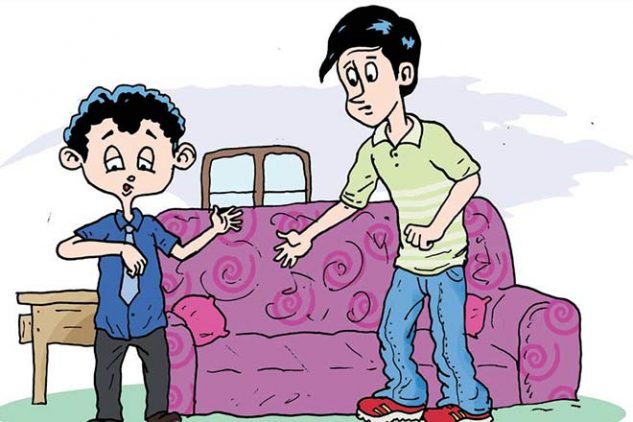
“No, it was an easy exam. I was happy when I received the question paper because I knew all the answers,” replied Karan.
“Then, why do you look upset?” asked Rajeev.
“I could not finish answering all the questions. I did not have a watch with me, so I lost out on the time I had to answer each question and plan the answers accordingly. I ended up spending a lot of time answering the first few questions. When the examiner announced that we had only 15 minutes left, I realised that I had a lot more questions to answer and could not finish it,” said Karan glumly.
“But why didn’t you wear your watch?” asked Rajeev.
“I completely forgot about the watch. Ever since I had started using the mobile, I had no use for the watch. So I guess, I eventually got out of the habit of wearing it,” said Karan.
“I agree that the mobile phone is very useful, but each gadget has its own
importance and limitation. Last week, one of my friends could not board the train because of the smartphone,” said Rajeev.
Karan was surprised. “What happened?” he asked.
“He was in the waiting room at the railway station and was playing games on his mobile. He was so engrossed that he forgot to keep track of the time and soon, the battery drained off as well and the phone switched off. Only after he asked someone for the time, he realised that he was late for his train and by the time he rushed to the platform, the train had left. He couldn’t even call anyone right away to make alternate arrangements as his phone had no battery,” said Rajeev.
“You are right, Rajeev. Mobile phones can be distracting and divert our attention from important things if we are not careful about how we use it,” agreed Karan.
More From Champak: The Greatest Treasure
“Anyway, now start preparing for your next exam and this time, take your wristwatch with you,” said Rajeev.
“Of course! First, let me quickly rush to the store and get new batteries for my watch,” said Karan.
The mobile phone and the wristwatch quietly listened to the entire conversation between Karan and his brother.
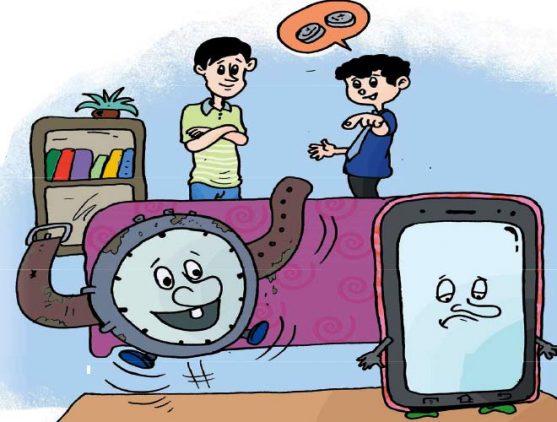
Both the watch and the mobile realised that they were important in some ways and had limitations in others. They decided to complement each other instead of fighting over who is better.

Wise Crackers
Jumbo Elephant: Where do ghosts go for a swim?
Blacky Bear: to the Dead Sea!
_________________________________________________________
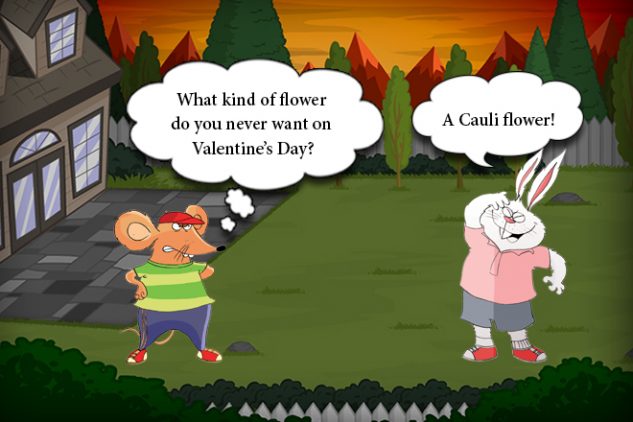
Meeku: What kind of flower do you want on Valentine’s Day?
Cheeku: A Cauli flower!
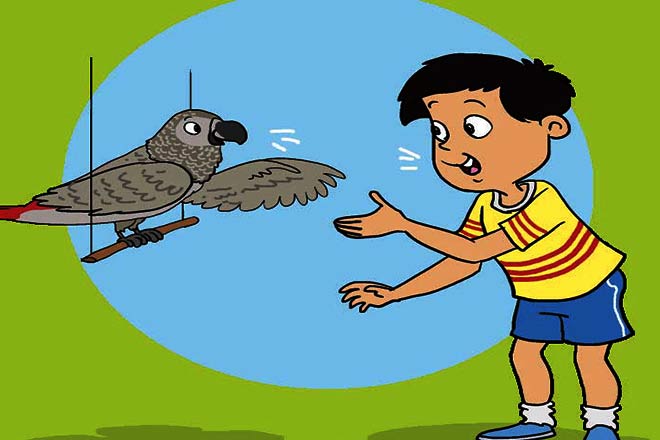
Us and Them
Parrots are commonly known to imitate sounds such as the barking of a dog and security alarms. Sometimes, they also repeat words. Unlike humans, parrots do not have vocal chords or lips. Parrots use a vocal organ called syrinx that controls the movement of air within the throat to produce different sounds. The syrinx can also produce two sounds at the same time. The parrot’s thick tongue aids in speech. When air passes through the syrinx, the parrot moves its tongue to produce sounds.
tongue to produce sounds. Among all species of parrots, the African grey parrot is considered to be the most intelligent and has a greater memory. Hence, it is able to learn a greater vocabulary.
The African grey parrot does not only speak human language, but it is also the only bird known to understand what it speaks. It understands what each word stands for. Cosmo, an African grey parrot, would use different phrases depending on whether the owner was in the room or not. When the owner was away, it would use phrases that established location like “I’m here”, “Where are you?”. When the owner was in the room, it would use phrases to establish interaction like “Do you want to play?”
Alex, an African grey þarrot, was trained by researchers to speak 100 words, identify 50 objects, 7 colours and 6 shapes!

Island Adventure
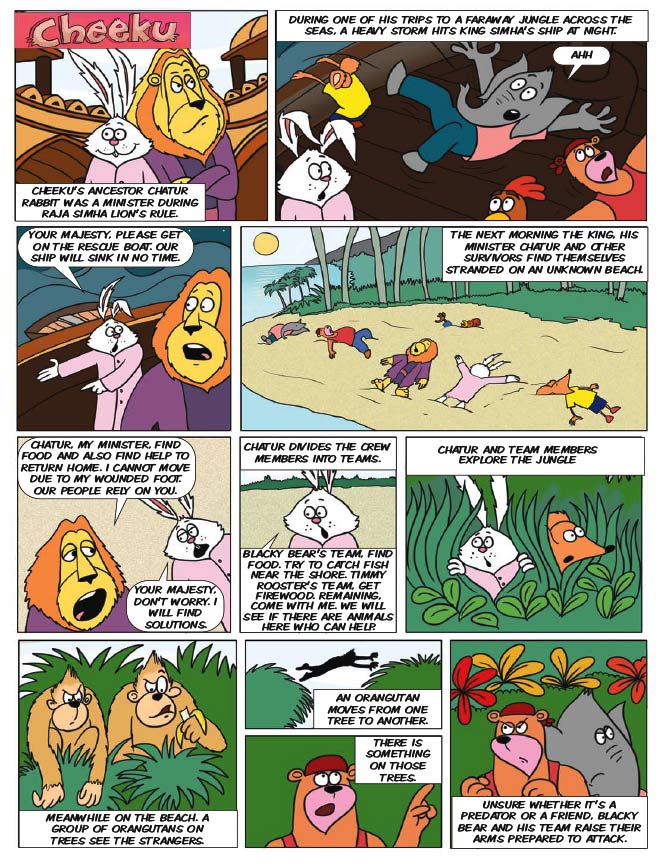
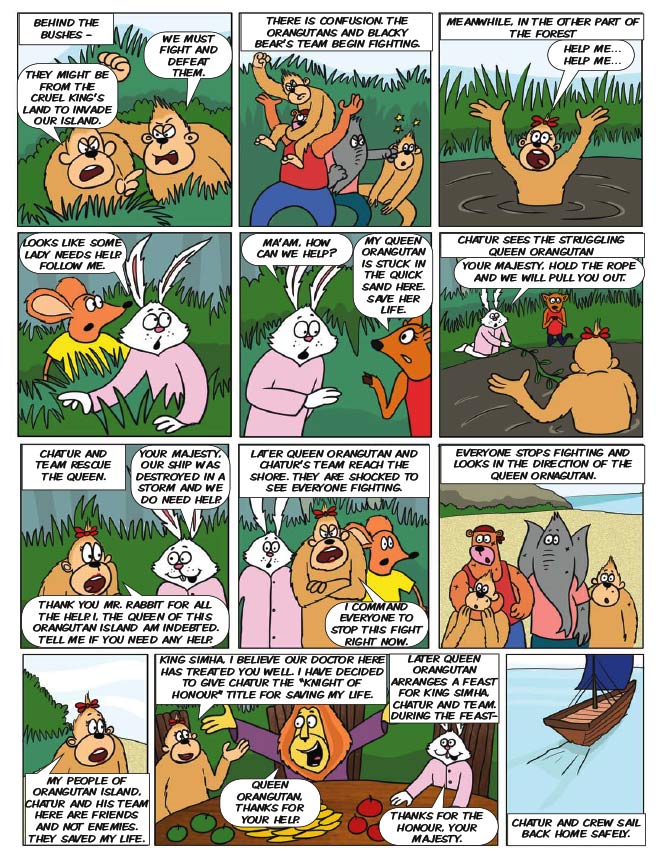

THE LONG-LOST FRIEND
King Sher Singh was generally very cheerful. But there were days when he turned sad and irritable. This usually happened when he remembered his old friend Ramu Singh.
King Sher Singh would grow so miserable that he would even forget to eat his meals and lose interest in important matters.
“Ramu, my friend,” he would murmur in his sleep. “Where have you gone? Please come back and forgive me.” King Sher Singh would then wake up with a jolt and start crying softly
On days like that, King Sher Singh would even stop coming to his court. He would keep to himself and sometimes even neglect urgent official matters. His ministers and Queen Sherni would grow worried, for they knew that King Sher Singh couldn’t afford to neglect his kingly duties. But they couldn’t do much and they would patiently wait till he felt better.
But of late, Minister Chatur Jackal had noticed that King Sher Singh’s bouts of sadness were lasting for very long. And that, they were not only was affecting his duties as a king, but also his health.
Chatur Jackal couldn’t stop himself from going up to King Sher Singh. He was very concerned about him.
“Your Majesty,” Chatur Jackal said politely.
“I don’t mean to be inquisitive but may I ask what exactly makes you so upset sometimes? Why don’t you share your worries with me? You’ll feel much better if you do. And who knows, I might just be able to help you solve your problem.” King Sher Singh trusted Chatur Jackal and thought of him as a friend. And so, he decided to share his problem with him.
“Well, Chatur,” King Sher Singh said as a few tears rolled down his eyes. “I had a very dear friend in my childhood. His name was Ramu Singh. He was my best friend. We played games and studied together everyday. But one day, we had an argument. I lost my temper and said some very harsh things to my friend. Ramu Singh was hurt. He left the forest without telling anyone where he was going. I think of him sometimes and wonder where he went. How I wish that we were still friends.”
“Oh!” Chatur Jackal said to himself after hearing King Sher Singh’s story. “So, King Sher Singh is missing his old friend. Well, it is indeed sad. But he isn’t doing anything about it. There are many animals and birds in Champakvan who have been separated from their parents, siblings and children. I should introduce King Sher Singh to them and tell him what they do.”
Chatur Jackal then listed out the names of some of the animals who had been separated from their loved ones.
“Blacky Bear was lost when he was just a cub,” Chatur Jackal recalled as he noted the names down. “He has been looking for his parents ever since then. And Roopi Deer’s son had been kidnapped by Kalu Jackal a long time ago. She hasn’t given up hope and is still searching for him.”
Chatur Jackal then took King Sher Singh to meet Blacky Bear and Roopi Deer. After hearing their stories, King Sher Singh realised that he was not the only one who had lost someone he cared about. There were others too. But unlike him, they were working hard to find them.
King Sher Singh decided that he too would look for his long-lost friend. He then sent his soldiers to look for Ramu Singh.
“Go to all the rivers, mountains, fields, forests and lakes in the land!” he ordered. “Leave no stone unturned. You must find Ramu Singh.”
And so, the soldiers did as they were told. But they didn’t find Ramu Singh anywhere. King Sher Singh didn’t lose heart. Instead, he joined his soldiers in the search.
One day, King Sher Singh came across a rocky hill covered by trees. He noticed the marks of a lion’s paws on the ground.
“Hmm,” he wondered. “Could my long-lost friend be here?” King Sher Singh then ordered his soldiers to search the entire area thoroughly.
The soldiers soon spotted a lion sitting outside a small cave. He was dressing the wounds of some injured birds and animals. They went and told King Sher Singh about it.
King Sher Singh recalled how his friend Ramu Singh had always wanted to be a doctor. “Could that be Ramu Singh?” he said hopefully. He then ran to the cave.
King Sher Singh’s happiness knew no bounds when recognised the lion sitting there. Yes, he was his friend Ramu Singh.
“At last! There’s my long-lost friend,” he said to himself. “I can’t wait to talk to him!” King Sher Singh started to walk towards Ramu Singh. But then he hesitated and stopped mid-way. He remembered the last time they had met, and the harsh words that he had spoken. Chatur Jackal, who had accompanied King Sher Singh, understood his dilemma.
“Go on, Your Majesty!” he said and encouraged King Sher Singh to go further. “You have been waiting for this moment since very long!” King Sher Singh nodded and slowly walked towards Ramu Singh. Ramu Singh looked up and wondered who, dressed in royal attire, was coming to meet him.
When King Sher Singh came closer, Ramu Singh’s eyes twinkled. He recognised his friend immediately and jumped up and hugged King Sher Singh.
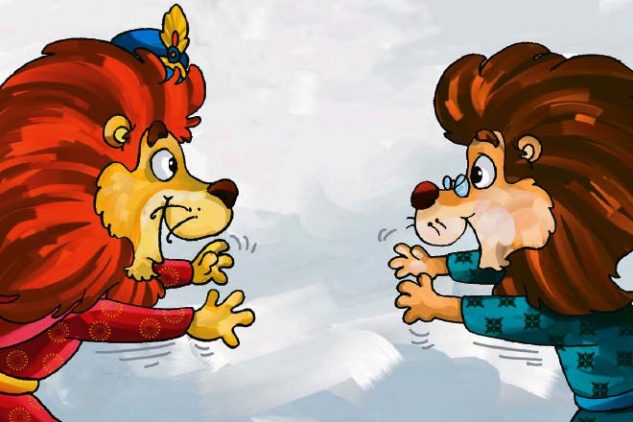
Soon, the two friends had tears in their eyes. “I wish I hadn’t been so harsh, Ramu,” King Sher Singh said. “Please forgive me.”
“And I wish I hadn’t walked away in a huff and not kept in touch,” Ramu Singh said. “I’m sorry too.” The two friends then sat together and laughed and talked happily. Chatur Jackal and the soldiers were happy to see King Sher Singh look so cheerful once again.
“Your Majesty,” Chatur Jackal told King Sher Singh later that day. “Don’t you wish that you had looked for Ramu Singh right after he left, and apologised immediately?”
“I wish I had,” King Sher Singh said. “Had I done that, I wouldn’t have felt so miserable for so many years.”
After that, King Sher Singh never felt gloomy or irritable again. He didn’t neglect his duties either. He now understood that any misunderstanding in a friendship should be sorted immediately. He stayed in touch with Ramu Singh and was careful not to lose his temper or say anything that was harsh again. He didn’t want to lose his friend again.
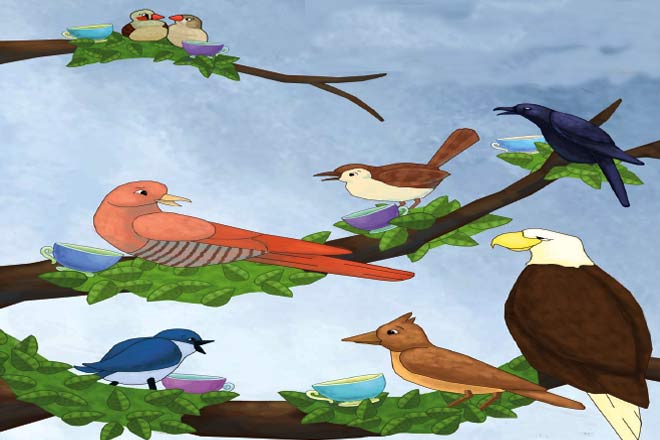
The Hedge King
Once upon a time, long, long ago, even before humans inhabited the earth, Miss Cuckoo who loved the good life, decided to have a special tea party.
She invited all the birds she knew. She even sent fancy invitation cards to the great eagles, to the larks, the finches, the swallows and the crows. Miss Cuckoo also sent an invitation to the little brown bird that sings alone in the hedges and has no name.
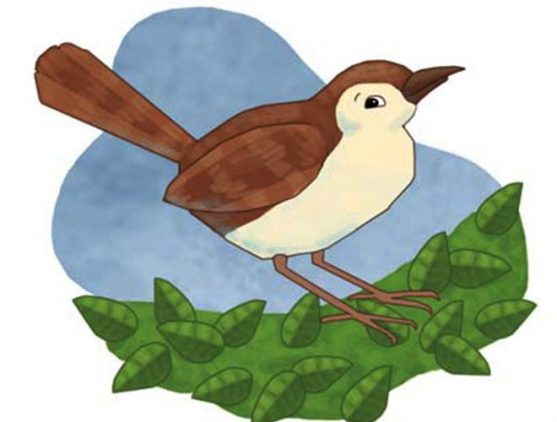
As the feathered creatures arrived, Miss Cuckoo greeted them warmly and asked them to sit around a grand old tea table. She then graciously gave them cups of sweet tea and whatever they liked to eat best. The birds wondered why Miss Cuckoo had taken so much trouble to have such a grand tea party and gather them all together. And as the saying goes to this day, they thought that she was being “as silly as a cuckoo”.
When the birds had drunk enough tea and had eaten to their heart’s content, Miss Cuckoo hopped on to the centre of the table. “Friends, listen carefully,” she said. “We birds need someone to be our King. And so, I suggest that we crown one of us as the King of Birds today, so that there’s someone to lead us all and look after everything.” The birds began to chirp and chatter. “That’s a good idea!” they said.
Then, almost each bird present at the tea party, offered to be the King, as each was sure that he had royal blood in his veins.
Soon, the birds began to argue and quarrel amongst themselves. Just then, Mr. Rooster came by with his many wives, the hens. He heard the commotion and rushed in.
When Mr. Rooster heard what the problem was, he instantly had a solution to offer.
Well, Mr. Rooster was an expert at settling disputes since he was used to solving the many quarrels that broke out amongst his many wives.
“Why don’t we have a contest?” he suggested. “We will never decide anything by arguing. We can appoint the bird who is able to fly the highest as the King of Birds!”
All the birds liked Mr. Rooster’s idea. Except for Mr. Plover. He was a small bird who lived near the water. Mr. Plover got up in a huff and walked into the woods without saying a word. In the meanwhile, the other birds got ready to prove their mettle.
They stood in a row and spread their wings wide open. They then flew with all their strength, and as high as they could, high up into the air. Mr. Lark flew higher than the other birds at first. But soon, he was beaten by Mr. Eagle who soared so high, that in no time he looked like a speck in the sky.
“Aha! So, Mr. Eagle is the King of Birds!” Miss. Cuckoo chanted joyfully.
However, the birds soon noticed that there was another speck in the sky. And it was much higher than Mr. Eagle.
They realised that it was the little brown bird that sings alone in the hedges and has no name. He had hidden himself in Mr. Eagle’s magnificent feathers and had flown with him for a while.
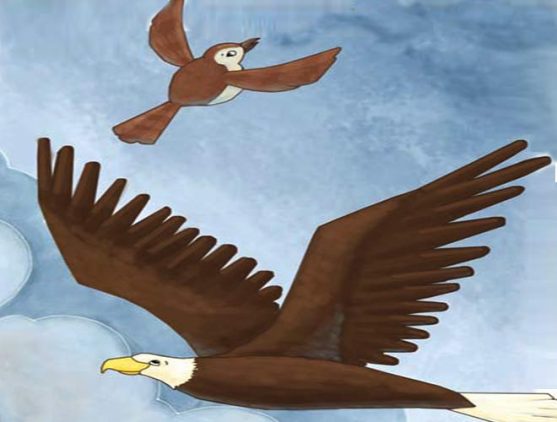
He had then broken away and flown higher all by himself. “No! I am the King of Birds!” the little brown bird twittered as he flew down and joined the others. Most of the birds objected. “You’re a tiny bird! You’re not fit to be a king!” they argued. Mr. Rooster came up with an idea once again.
“I’m sorry,” he said. “The mistake is all mine. If you don’t want this wee bird to become the King of Birds, let me give you another idea. Why don’t we make the bird who is able to fall deepest into the earth our King?”
And so, all the birds began to look about for places to jump into. Mr. Duck even tried to see how long he could hold his breath for, since he planned to jump into a pond. In the meanwhile, Mr. Rooster called out to his many wives and instructed them to dig a deep hole in the ground.
He then hid himself in the hole and crowed, “Cock-a-doodle-doo! I am the King of Birds now!” However, the little brown bird that sings in the hedges and has no name, outdid Mr. Rooster. He crept into a mouse hole and chirruped, “No, I am! I am deeper in the earth than any of you are. I am your King!”
All the birds decided that they would not acknowledge the little brown bird or let him come out of the mouse hole and claim his title. They asked Mr. Owl to sit near the opening of the mouse hole and keep a watch. All the other birds then flew home since they were tired after Miss. Cuckoo’s tea party and the contests they had participated in.
Mr. Owl stayed on and kept awake all night. He watched the mouse hole carefully and did not allow the little brown bird to even peep out. But when morning dawned, Mr. Owl found that he couldn’t keep his eyes open anymore. They simply drooped and shut. In no time, Mr. Owl fell fast asleep.
The little brown bird quietly skipped out of the mouse hole with the help of a few mice.
“Ha ha!” he chirped and laughed as he came out. “I will give myself a name now! I will call myself ‘The Little Hedge King!”
The other birds were disappointed when they found that the little bird had outsmarted them. They accused Mr. Owl of being lazy and not doing his job well.
Well, this is why Mr. Owl still sleeps in the daytime and stays awake at nights. And this is also why he watches mice and mice holes so carefully.
As for the little brown bird who sings alone in the hedges, he really made himself a king. Some people call him the wren while some others, ‘The Little Hedge King’.
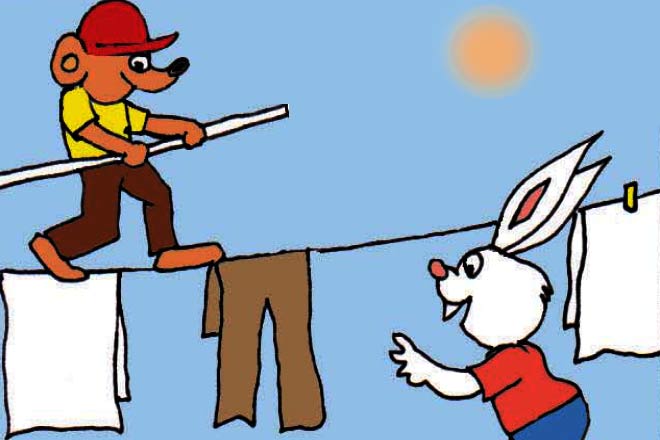
Laundry Escape
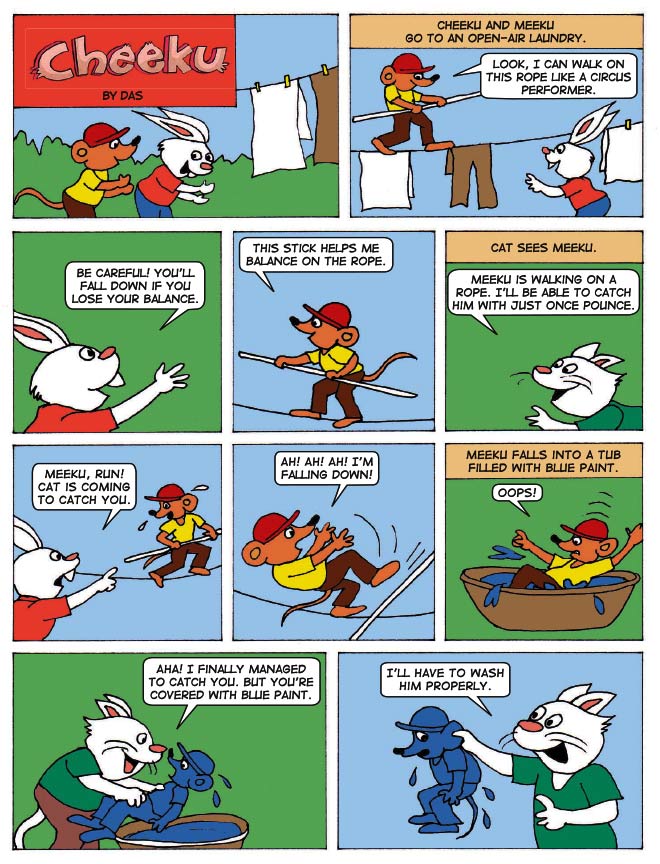
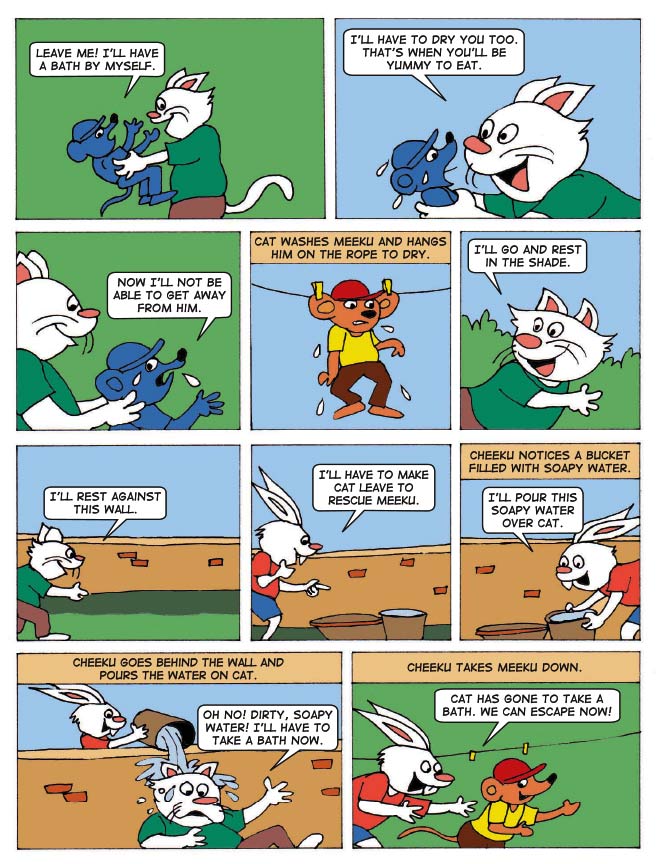

Sai Nithika Yakkali


The Ocean
As I look from the edge of the ocean,
Glimmering golden, for it’s almost dawn,
So many waves coming towards me,
And yet I know, there’s a lot more going on.
The ocean stretches for miles around,
So many creatures with fins and gills,
So many miles below the ground.
The waves are splashing closer and closer,
As I realise the world is bigger than it seems,
As I stare into the ocean,
In golden light, it gleams.
-Harshita Das
11 years, Noida

How To Make Fire Extinguisher At Home – Kids Science Experiments
Note: For this experiment parental guidance is required.
For that You will need:
1. Old Soap Bottle
2. Vinegar
3. Tissue Paper
4. String
5. Scissors
6. Baking Soda
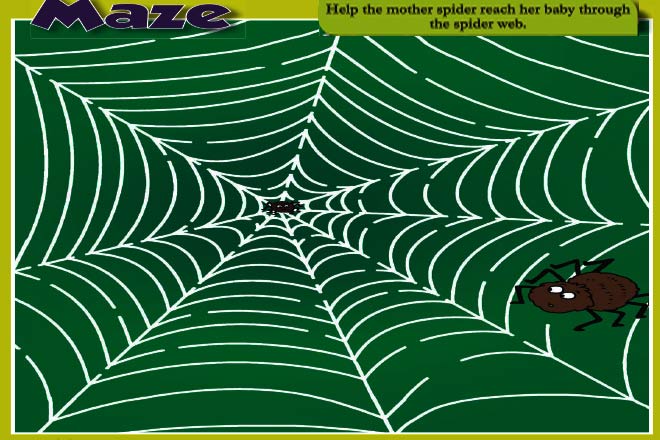
Maze of Web
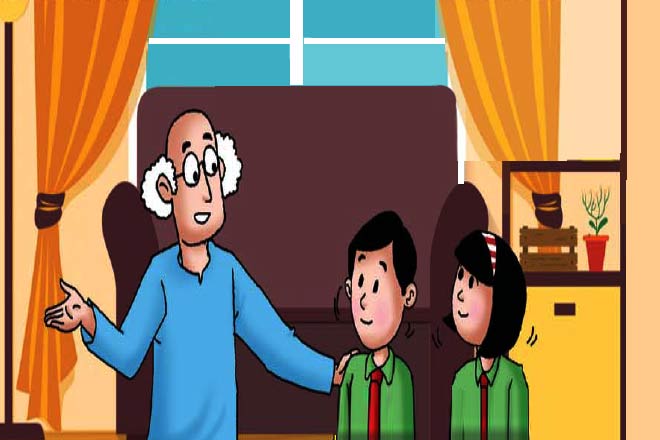
Dadaji And Bullying
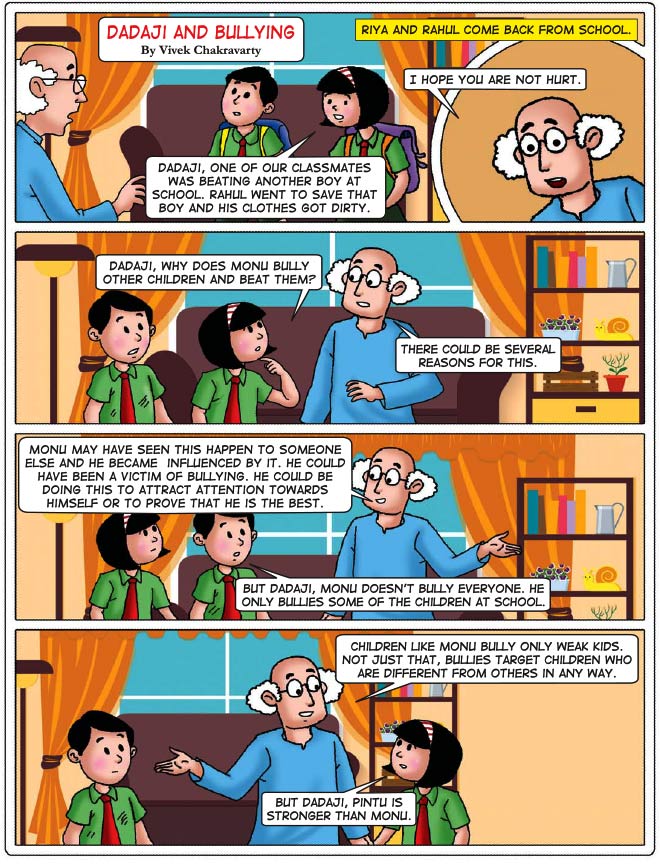
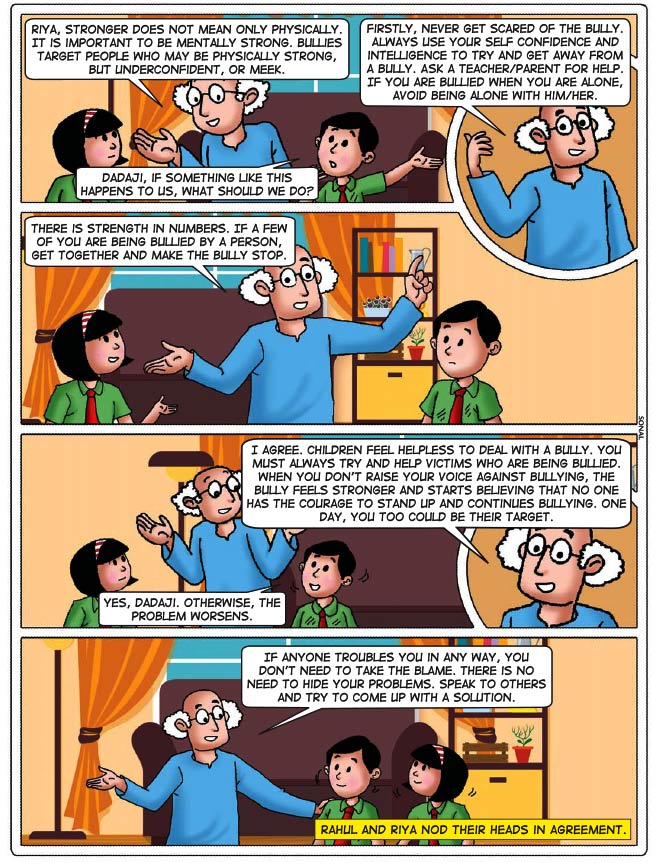
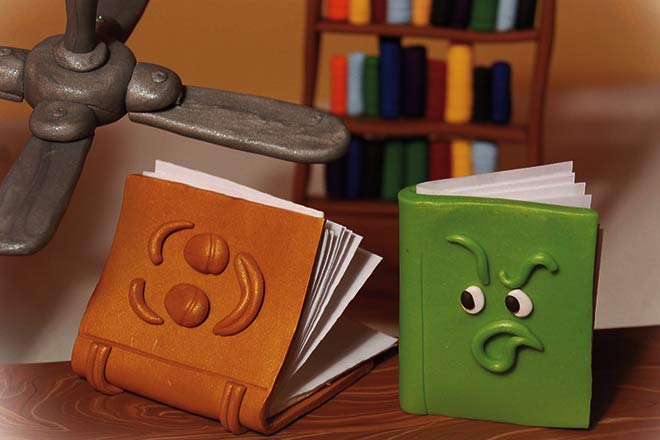
Conversation of the Books
It was afternoon. The books in the library were resting. The story book was the laziest of all and just lay down where it was. Its pages were fluttering in the fan’s breeze, but the lazy one was not at all worried to take care of the pages. The thin Mathematics Book standing just opposite to Cheeky, the story book was looking at its condition of the book.
“Cheeky set your pages properly!” She said.
“Let it be. I want to sleep for the moment,” Cheeky was just saying when Venkat quickly picked her up. “I will read this book. It has many interesting stories.” Venkat said happily. Cheeky was irritated.
“Oh! This Venkat troubles me every day during my rest time. Whenever I think of resting he picks me. I cannot rest during the day or sleep at night because of him. I do not know how to get rid of him?”
Cheeky was upset. She had wanted to rest the whole day and here she could not rest for a moment. What could she do? She went along with Venkat with a long face.
The next day Cheeky, saw Venkat coming towards her as she was about to rest.
“Oh! He has come again today. Let me run away.” Cheeky ran and hid behind some thick books.
“I am safe here.” Cheeky thought. However Venkat was removing the thick books in search of her.

“Where do I hide now?” Cheeky came out of there and went and sat on the topmost shelf of the cupboard.
“This is just right.”
Venkat was not leaving even the higher shelves. He took the help of a stool to climb up to the shelves that were out of his range.
“Now I will be caught.” Cheeky ran in confusion. “Be careful,” the other books cried out. But Cheeky pushed the other books in such a manner that all the books of that row fell. In bewilderment Cheeky jumped off the shelf.
“Wow! This is a good place. No one will ever know I am hiding here, because no books are kept here.” Cheeky exclaimed looking at the place underneath the almirah. She sneaked and hid herself. The Mathematics book was watching all this. At last it could not keep quiet any longer and said, “Why are you doing all this? Do you not understand the meaning of books? They are not meant for just themselves. Their life is meant to educate others. To show them the right path and you are a story book, full of morals. Whoever reads your pages will learn something or the other. He will find something new in life.”
“The joy one gets in being useful is more than in resting. Venkat likes you because you have a special importance in his life. You should try to go to Venkat. You should not do this, come out.” The Mathematics book tried to make her understand.
Cheeky was listening to her talk. After a long fruitless search Venkat went away empty handed, when he could not find her. Cheeky got a chance to rest. She lay down to sleep. She slept for a while in comfort.
However, soon she felt an emptiness. She was bored for no one was there beside her. She became restless after some time. She came out from under the almirah. She looked at the Mathematics book and said, “You told the truth my friend! But how should I climb up?”
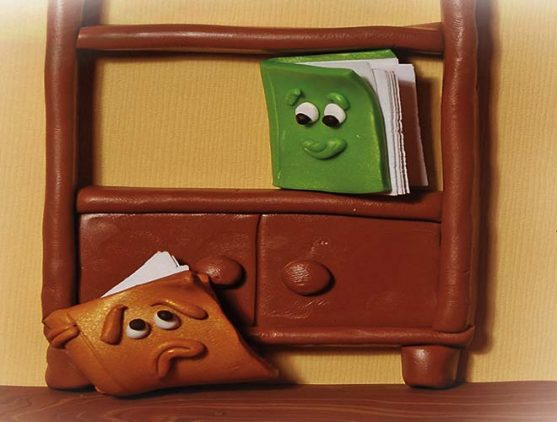
“Now you will have to wait for someone to come. But do not worry, this is a library where someone or the other always comes in. In any case Raju, the cleaner will come even if no one turns up. Be patient and do not panic,” said the Mathematics Book.
Cheeky calmed down. She smiled and said, “From where have you learnt such good things, my friend?”
“I read all these from your pages, when you were too lazy to put your pages together.” On hearing these words of the Mathematics book, Cheeky felt ashamed. Now she just waited for someone to come, pick her up and place her back in the almirah so that Venkat could read and be happy.
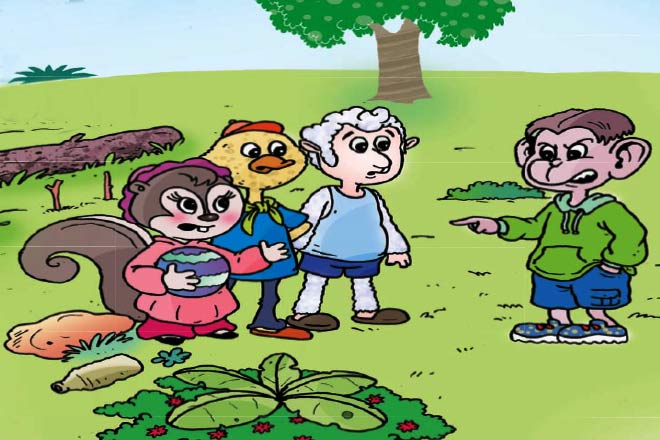
A Taste of His Own Medicine
Chikki, the squirrel, Lonu, the lamb, and Dimpy, the duck were playing with a ball, when Chintu, the monkey arrived and said, “I want to play too!”
“No, you will create some trouble like you do every time you play with us,” said Chikki.
“You always cheat and end up fighting with us. We don’t want to play with you,” pitched in Dimpy.
“How dare you refuse to let me play!” fumed Chintu.
“Just sit quietly and watch us play until you learn to play fair,” said Lonu.
At that moment, one of them threw the ball up in the air. Chintu caught it in a flash and ran away shouting, “Ha ha! Now I’ll see how you continue to play without me.”
Chintu was notorious in the forest of Sonavan for causing trouble. Many animals would fall prey to his mischief. Once during the monsoon, there was a puddle of muddy water under a tree. Chintu sat on a branch of that tree and threw stones into it whenever any animal walked by, splashing muddy water all over them.
“I see that your clothes have gotten dirty,” Chintu commented cheekily after splashing muddy water on Dina, the deer. “But don’t worry; get them dry-cleaned at the laundry. I’ll pay for it!”
A little later, he threw a stone that splashed muddy water on Koni, the fox’s face. Chintu laughed and said, “That make-up looks good on you, Koni! You should do this every day, or just go to the parlour to get yourself cleaned up. I’ll pay for it!”
Koni walked away grumbling, “This Chintu is nothing but a menace.”
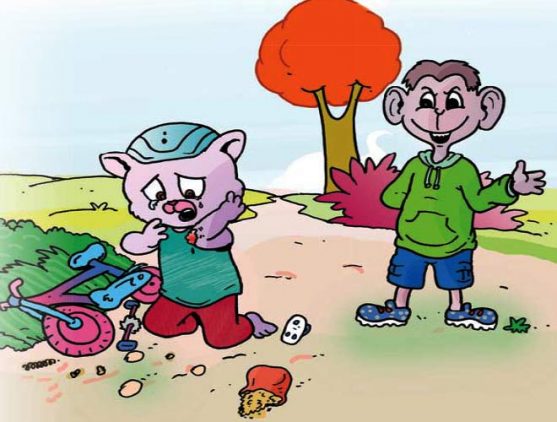
Another time, Chintu had pushed Kitty, the cat off her bicycle because she wouldn’t let him ride it first. Chintu laughed at Kitty, who was moaning in pain and said, “Don’t make a big deal out of this. Go to the doctor and I’ll pay for it.” Such was his behaviour.
One day, after the incident with Chikki, Lonu and Dimpi, Chintu was sitting on a tree and eating fruits when he spotted the three huddled behind a bush and whispering something among themselves.
Chikki whispered something which Dimpy was unable to hear. So she asked loudly, “What did you say? On the tree? What’s in the large bag?” “Shhh! Be quiet, Dimpy! Someone might hear us,” cautioned Lonu.
The three of them started speaking in whispers again. Chintu was curious to know what they were talking about secretively. He tip-toed close to the bush to listen in on their conversation.
“We must reach the spot before anyone else does, otherwise we will lose out on the opportunity,” said Lonu.
“There are three date palm trees behind the mound at the other end of the lake. A short distance from there, you’ll find a lone peepal tree. That’s where we’re going,” said Chikki.
“So, it’s settled then! We will meet tomorrow morning by the lake. But remember, no one should know about this. It should stay just between the three of us,” said Lonu. The trio agreed and left for their homes.
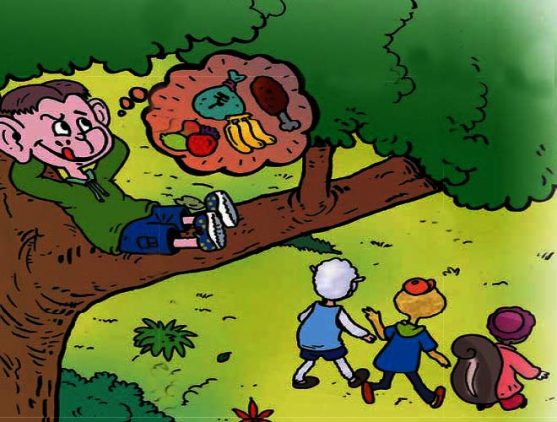
As soon as they left, Chintu thought to himself, “What could be in that large bag? Money? Food? Whatever it is, it must be something very special. And don’t they know that it’s impossible to hide something from someone as clever as me? When the three go there tomorrow, they will return empty handed because I am going to get my hands on it before them.”
Chintu left for the mound at once. He found the date trees and the peepal tree as described by Chikki. He climbed up the tree and began searching for the bag. It was getting dark, but he continued to search and finally found it. Chintu immediately opened the bag
Dimpy, Lonu and Chikki, who were hiding in a bush nearby, came out and said, “What’s the matter, Chintu?
Are you hurt? It looks like you have been stung by bees. Why don’t you go visit a doctor. We’ll pay for it.”
“You tricked me into coming to this place!” said Chintu, writhing in pain.
“But aren’t you’re the cleverest animal in the forest? Who can trick you?” said Chikki.
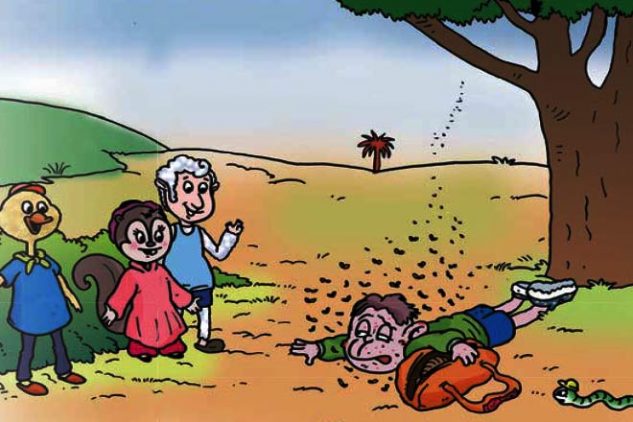
Chintu finally felt the pain of all those whom he had troubled and laughed at. “I am sorry,” he said, realising the folly of his ways. “I have been blinded by my own arrogance. Thank you for making me realise it.”
“We just wanted to show you how it feels to be on the receiving end of your pranks. We are happy it worked,” said Dimpy.
The three of them helped take Chintu to the doctor and too care of him for the next few days. Then on, they all remained friends and Chintu did not revert back to his old ways.

Laughter House
Foxy Fox: Jumpy, why are you solving your math sums on the floor?
Jumpy Monkey: Because you told me to solve them without tables!
_______________________________________________
Ted Toad: When do you stop at green and go at red?
Henry Hen: When you are eating a watermelon.
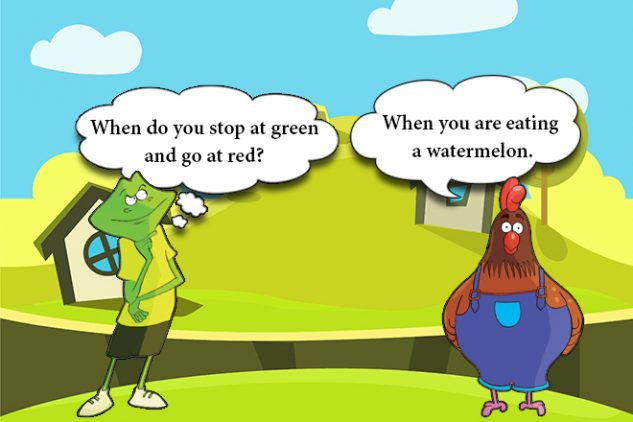
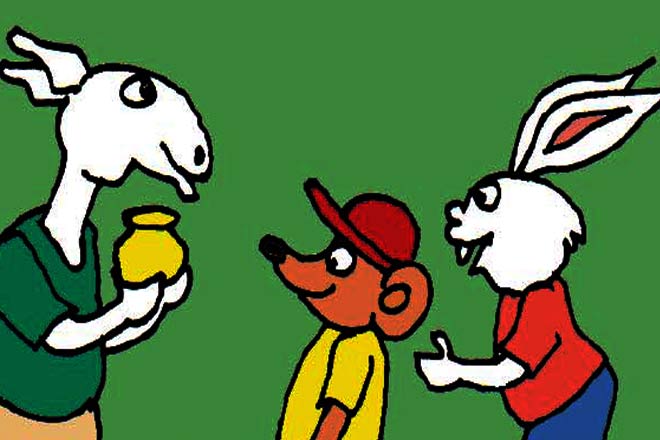
Escaping Hard Work
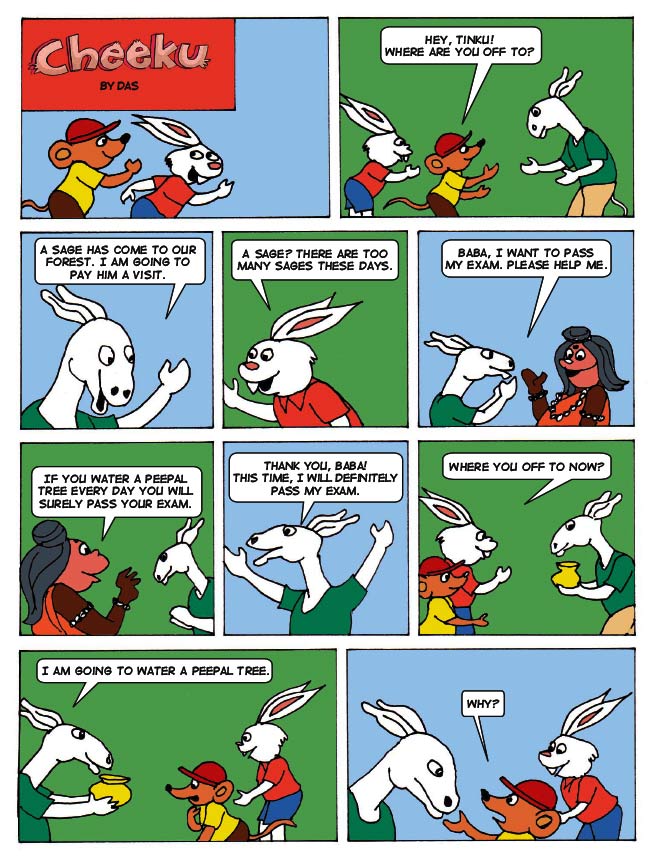
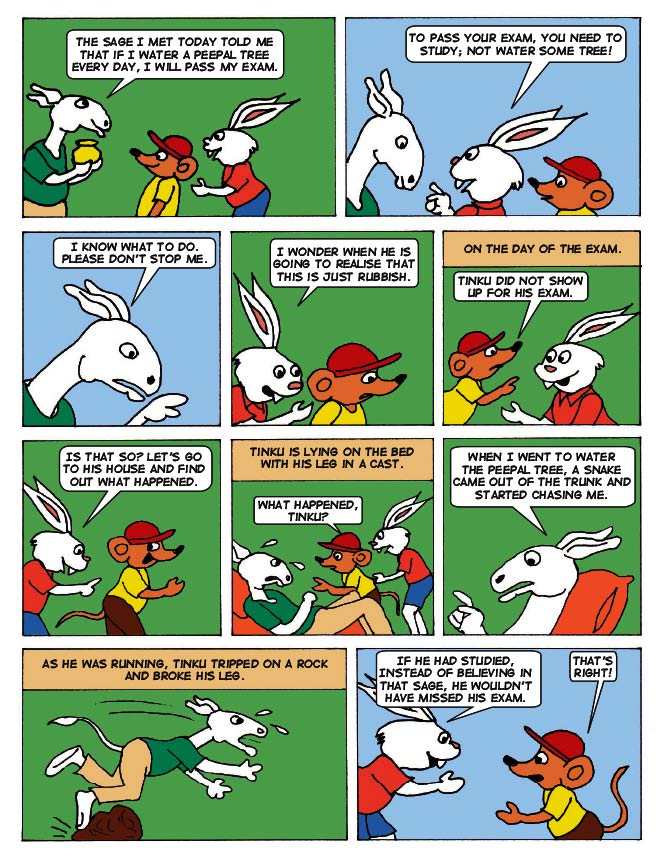
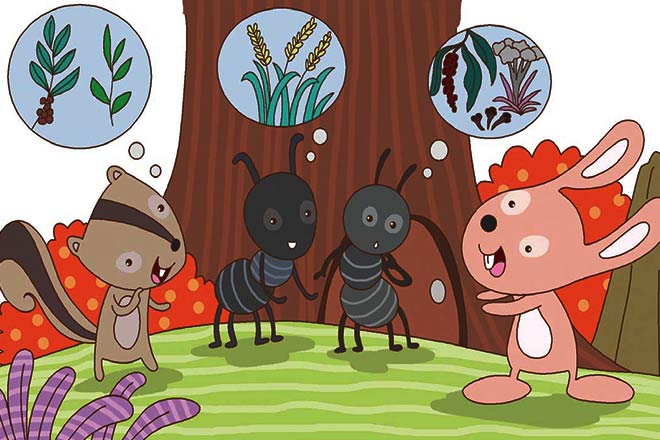
REAP WHAT YOU SOW
Skippy, the squirrel lived on a tree in the forest of Aria. Next to the tree was an anthill in which his friend Tiny, the ant and her family lived.
One day, Vicky, the rabbit moved into the forest and made a home for himself near the tree where Skippy and Tiny lived. Soon, the three became good friends.
During spring that year, Vicky said, “The soil here is fertile. Why don’t we cultivate something?”
“Yes, that’s a good idea. But what shall we sow?” asked Tiny.
“Since we like rice, why don’t we cultivate paddy crops?” suggested Skippy.
“Rice is mostly cultivated in the south of India because the soil there is smooth and retains a lot of moisture, which is necessary for paddy crops. If we were to sow rice here, then the crops will need a lot of water and additional care,” said Vicky.
“How about tea? I love drinking tea!” said Tiny’s cousin Teeny.
“I like spicy food; let’s plant some spices,” said Tiny.
“A hilly terrain is best suited for tea, coffee and spices. They can be grown only by way of terrace farming and they require a chilly climate. It’s too hot here to grow these crops,” said Vicky.
A Taste of Their Own Medicine
“How do you know so much about the different types of crops?” asked Skippy in awe.
“I love horticulture. It is the art and science of growing plants. I have read many books on this subject. Currently, I am reading one on the different types of soil,” said Vicky.
“That sounds very interesting. I thought they were all the same. How many different types of soil are there?” asked Tiny curiously.

“Broadly, there are six different types of soils in India classified according to their characteristic, composition and region: alluvial, laterite, red, black, desert and mountain soil. Our forest has alluvial soil which is extremely fertile. It is so because rivers like Ganga and Yamuna flow down from the mountains bringing with them rich minerals and rocks. Wheat, sugarcane and pulses are best grown in this soil,” said Vicky
“In that case, how about we plant wheat crops?” asked Skippy.
Everyone agreed and began planning. Next day, Vicky brought along his friend Annie, the mole.
“Hello friends, meet Annie. She will also help us with the farming,” said Vicky.
Skippy and Tiny were not happy about Annie joining them. They did not mention it to Vicky, but later that evening, the two met alone to discuss the situation.
“What work will the mole do in the farm?” Skippy asked Tiny. “You and your family will sow the seeds. Vicky and I will water the crops. We will also use our sharp teeth to harvest them later and you will carry them back to our houses. But what will Annie do?”
“Even I don’t understand why Vicky had to bring her along. The more people there are, the lesser will be our share of the crops. But what can we do? Cultivating crops was Vicky’s idea and we can’t tell him not to bring his friend,” said Tiny.
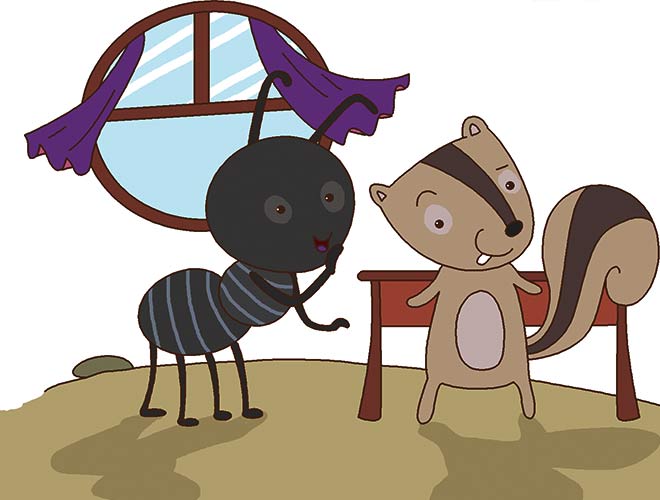
As the two wondered what to do, Tiny suddenly had an idea. She shared her plan with Skippy, who agreed to it delightedly. The following day, all four of them set to work, ploughing the land, planting the seeds and watering it. As weeks passed, the seeds began to sprout. In a matter of months, the tiny saplings had become full-grown wheat crops. They had to take extra care of the crops for fear that it would get stolen or damaged by pests.
During the day, Vicky would take care of it and at night, it was the responsibility of Skippy and Tiny to keep an eye on the crops.
One morning, Tiny and Skippy frantically came running to Vicky and said that some of the wheat crops had disappeared.
More From Champak: Tit for tat
Vicky was shocked. “But how is that possible?”
“I suspect Annie. Two days back, I heard her talking to her friends and plotting to steal some of the crops. We must remove Annie from our group immediately,” said Skippy.
“I think it’s you two who should be removed!” said Vicky.
“Why should we be removed?” asked Tiny and Skippy surprised.
“That is because it was your responsibility to keep an eye on the crops at night. If the crops were stolen during the night, it means that you have not done your work properly,” replied Vicky.
“Even otherwise, while we three were doing all the hard work, Annie was just roaming among the crops and playing in the soil,” said Skippy angrily.
“So, that is the real reason!” realised Vicky. “I began to sense your growing dislike for Annie because you think she does not help with the farming. What you both don’t know is that she is the reason this crop has grown so well,” said Vicky.
On hearing this, Skippy and Tiny were taken aback. “How is that possible?” they asked.
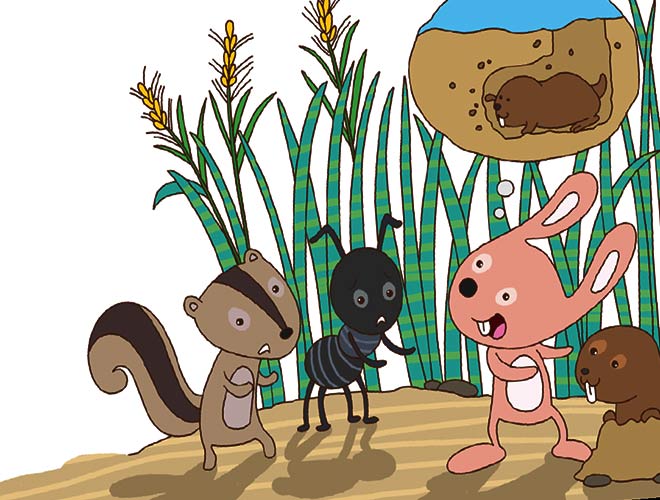
“Moles are good at digging. Because of the holes she dug around the land, water and air could mix well with the soil. This ensured that the soil’s nutrition and minerals were replenished, thereby making our crops grow well,” explained Vicky.
Skippy and Tiny realised their mistake and were ashamed about their behaviour. They apologised to Annie and returned the crops they had stolen at night to put the blame on Annie. That day on, the four of them worked together with cooperation and respected each other’s hard work.
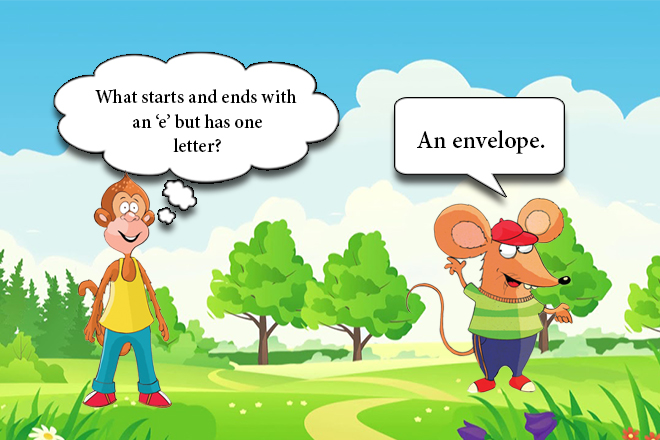
Jollification
Jumpy Monkey: What starts and ends with an ‘e’ but has one letter?
Meeku: An Envelope.
___________________________________________
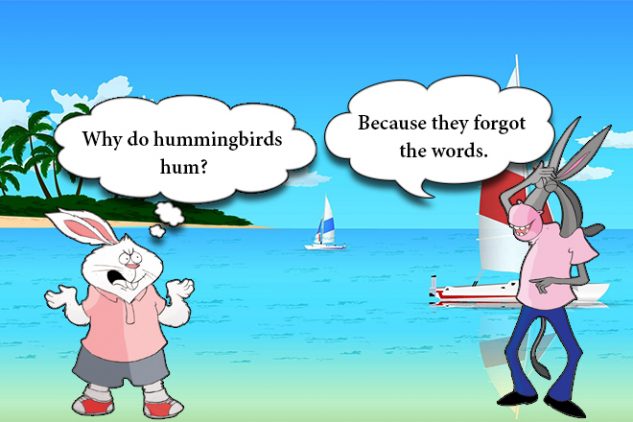
Cheeku: Why do hummingbirds hum?
Damru: Because they forgot the words.
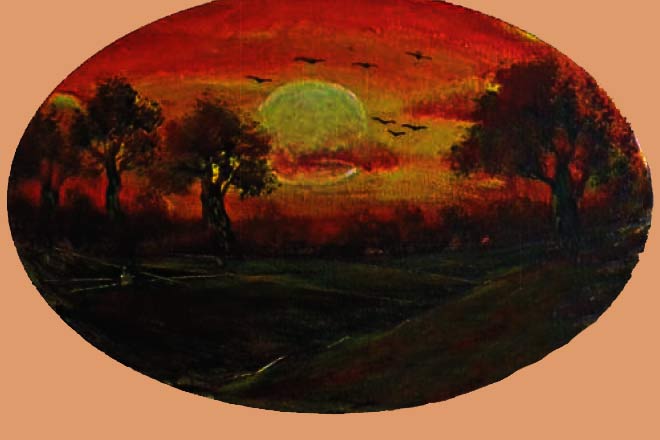
Navya Ankit
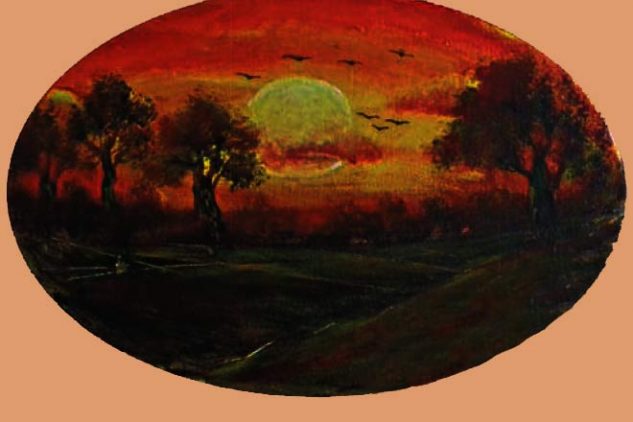
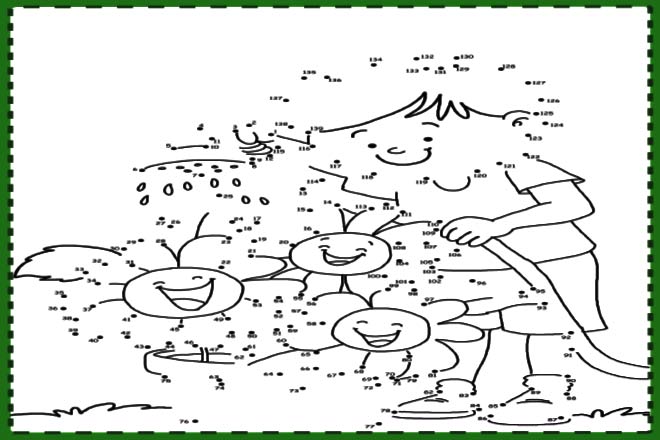
Watering the Flowers

Snail’s Pace
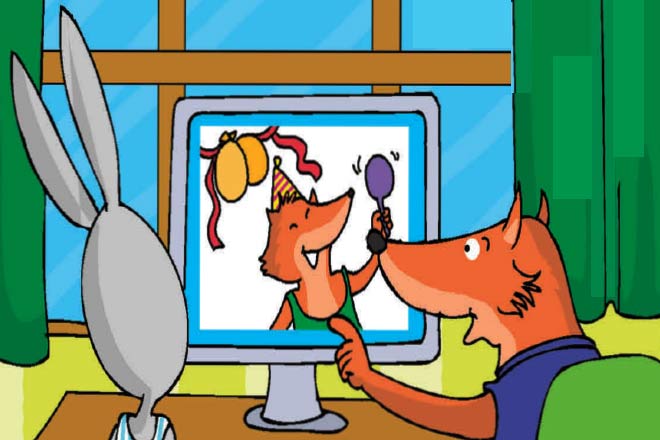
Damru & Facebook
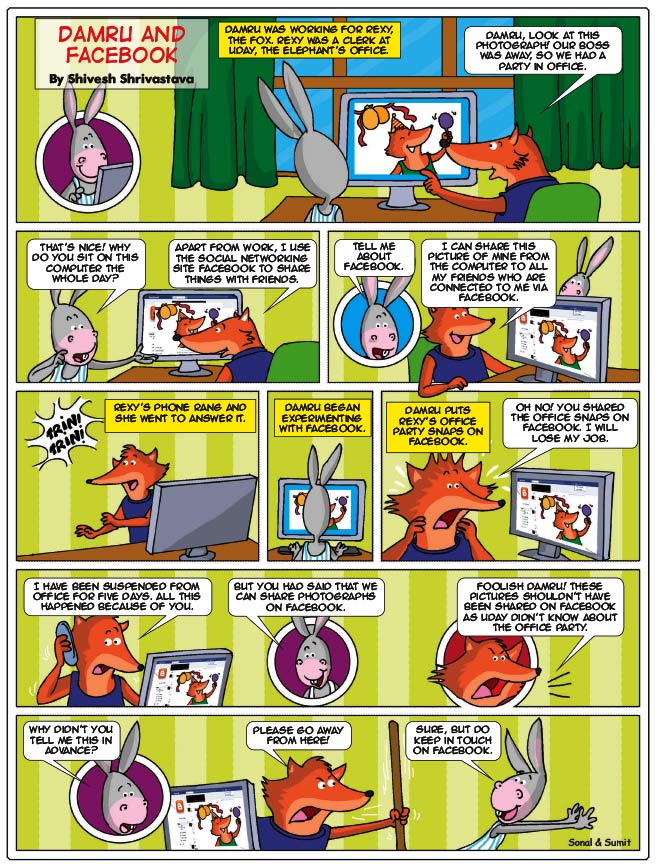

Toto Finds His Way
Deep lived with his parents and grandfather in Delhi. Every evening he played with his beloved pet dog Toto in the park.
After a while, many people stopped playing sports and flew kites. Deep also stopped going to the park with Toto. Instead he started flying his kite on the roof with his friends. Deep loved to fly a golden kite. Many people recognized Deep’s kite because of its unique colour.
Days passed. Toto was bored. He felt neglected. One day, when Deep’s mother went shopping in the morning, she forgot to lock the main gate. Toto saw this as an opportunity to run to the park.
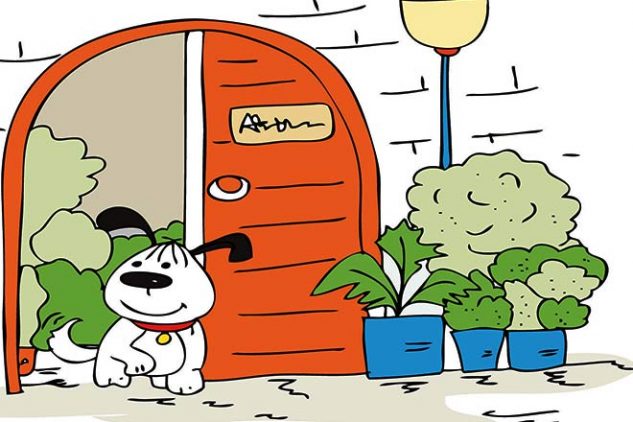
He slipped through the door and ran out. Toto used to accompany Deep to the park. Hence didn’t know the way to the park himself. Luckily he saw Deep’s friend Shyam going towards the park and followed him.
After reaching the garden, Toto ran through the bushes. He was so excited that he ran happily throughout the park.
He was glad that he could return to the park.
Soon it grew dark. Dark clouds covered the sky. Everyone in the park rushed home.
Toto realised that he should get back home through the front gate. But Toto was lost. He looked left and he looked right, but he didn’t know which way to go. Everyone in the park had already left, so Toto couldn’t ask for help. He began to panic and felt a little afraid. He walked around aimlessly.

It started to rain and Toto was walking alone on the streets. Meanwhile, Deep had come down, as he had thought of playing with Toto. He searched for him everywhere in the house, but he could not Toto.
The whole family wondered where Toto was. As soon as the rain stopped Deep and the other family members went out on the streets, calling Toto’s name.
More From Champak: Damru And The Pet Snake
They went to the park, the market, the badminton grounds, but were unable to find Toto. Deep returned home disappointed and sad.
The family members returned too, failing to find Toto. They were heartbroken and tensed and began to think on ways to find Toto.
Suddenly Deep’s grandfather exclaimed, “I have an idea!” He told the others the plan. Everyone agreed and hoped it would work. Deep and his mother got a big golden kite and attached golden sparkling papers to the thread.
Deep took the kite and ran to his roof. The whole family followed him.
Deep flew the kite higher and made it go further.
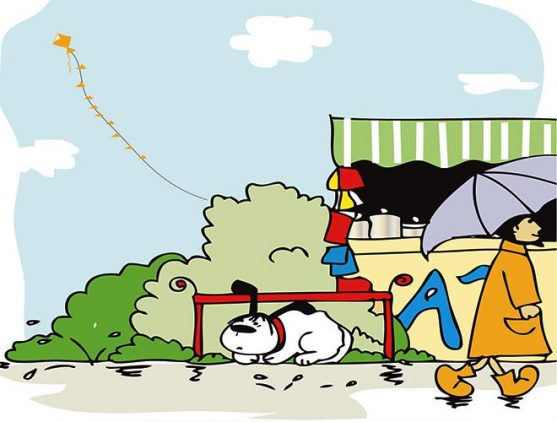
Toto in the meantime was crying as he couldn’t find his way back. He was hiding under a bench when he suddenly noticed something.
Looking carefully, Toto noticed a big golden kite flying in the sky. He was thrilled! Toto knew that only Deep flew golden kites.
Toto spotted the flying thread clearly because Deep had attached golden sparkling papers to the flying thread.
Toto followed the thread in the sky and after crossing a few streets, he reached to a familiar neighbourhood. Toto was happy and found his way home. He barked happily when he landed on the doorstep.

Everyone was happy when they heard Toto’s bark again.
Deep hugged him. Toto jumped around him. Deep never left his favourite pet alone again and took him to the park to play always.
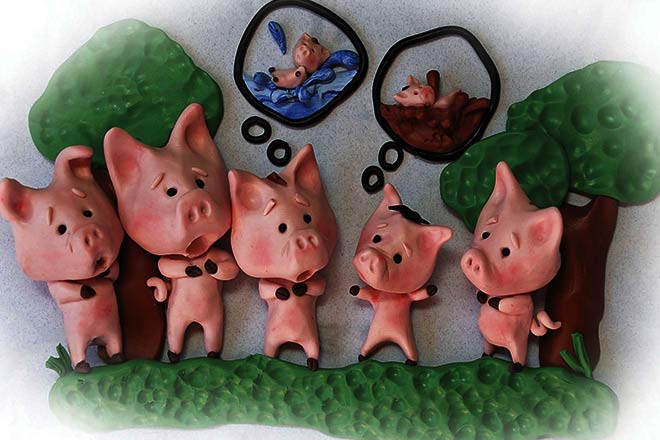
Little Gopu
Gopu, the pig was very naughty. He had a few naughty friends with whom he often went roaming. Sometimes his friends left him in a remote place and ran away. He often lost his way and had a tough time finding his way back home. Gopu still liked to play with them.
“Gopu, let’s go to the river. It is too humid. We’ll go into the water and play. You enjoy swimming, don’t you?” asked Ganu, the pig.
“Yes. I love to play in the river. Let’s go.” Gopu readily agreed.
“I am going to roll in the muck,” declared Bansi.
“Yuck! Dirty creature!” exclaimed Piyu.
Mantru interrupted, “We shouldn’t play in the muck. It spreads diseases. It’s important to be careful about hygiene. You can play in fresh water for sure.”
Bansi agreed. They decided to stay away from dirty puddles. They started walking towards the river.
They swam in the river for hours. However they were unaware of the approaching danger.
Four wicked foxes had seen them going towards the river.
Nakul, the fox said, “These tiny piglets are too tempting to resist. Let’s follow them and relish their tasty meat.”
Pandu, Sam and Baddy nodded their head and decided to attack the piglets.
They quietly proceeded towards the river and hid behind the bushes. They were patiently waiting for the right opportunity.
The piglets stepped out of the river and the foxes chased them. All the piglets, except Gopu, managed to escape from the foxes. Gopu was the youngest and couldn’t run fast. As a result, the foxes surrounded tiny Gopu.
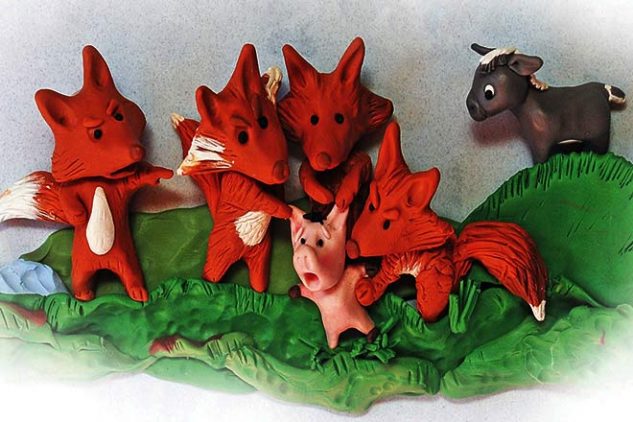
Nakul said, “Pandu and Sam, you hold him by his ears. Baddy, you hold his tail tightly.”
Deenu, the donkey was grazing near the river. Some weird noises drew his attention. He looked around and saw that Gopu was in danger.
Deenu immediately went near Gopu and started braying, “Leave the kid alone or all of you shall pay for it.”
“Deenu, stay away,” replied Nakul.
Deenu ran towards Nakul and kicked him hard. Nakul was injured but managed to flee.
The other three foxes also ran for their life.
“Thank you, Uncle. Had you not been present, I would have lost my life.” said Gopu.
Deenu said, “How did you come here?”
Gopu narrated how his friends forced him to come near the river.
Deenu said, “You should always obey your parents. Also, it’s not nice to be friends with such animals who leave you in danger. Learn from this incident and never repeat such a mistake. Come, I shall drop you home.”
“Uncle, please don’t tell my parents about the incident. They’ll be disappointed and worried,” pleaded Gopu.
Deenu said, “I will not tell your parents only on one condition. You shall promise to always obey your parents and avoid bad company.”
“I promise, Uncle,” said Gopu.
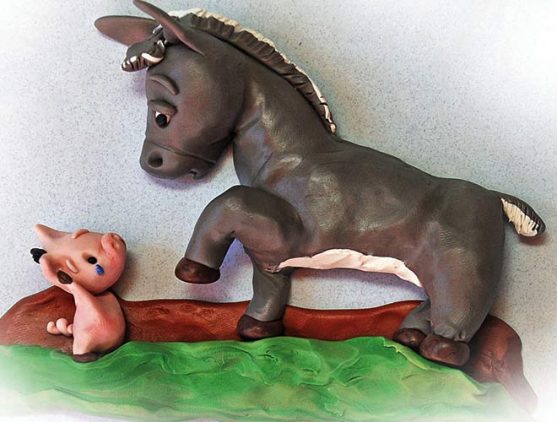
Deenu dropped Gopu near his house. Gopu decided to obey his parents. He gave up talking with his selfish friends and made a few new friends. Gopu had learnt a lesson. He took great care never to put his life in danger again.
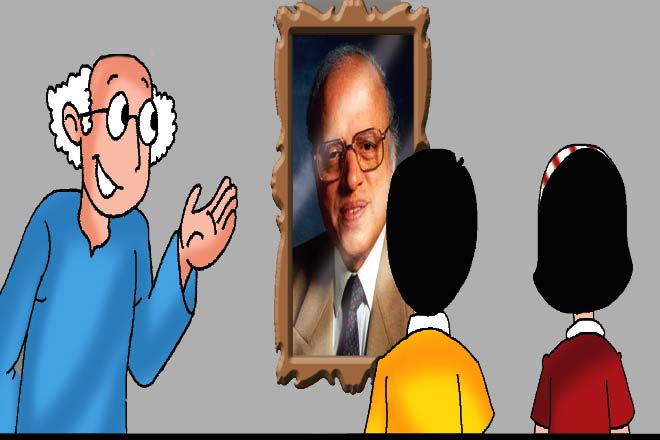
Creators of India
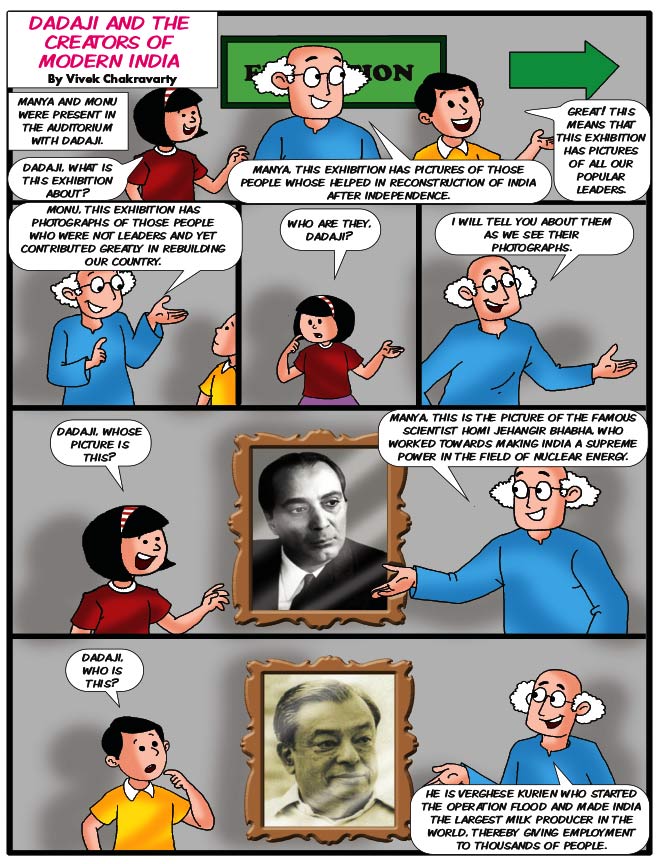
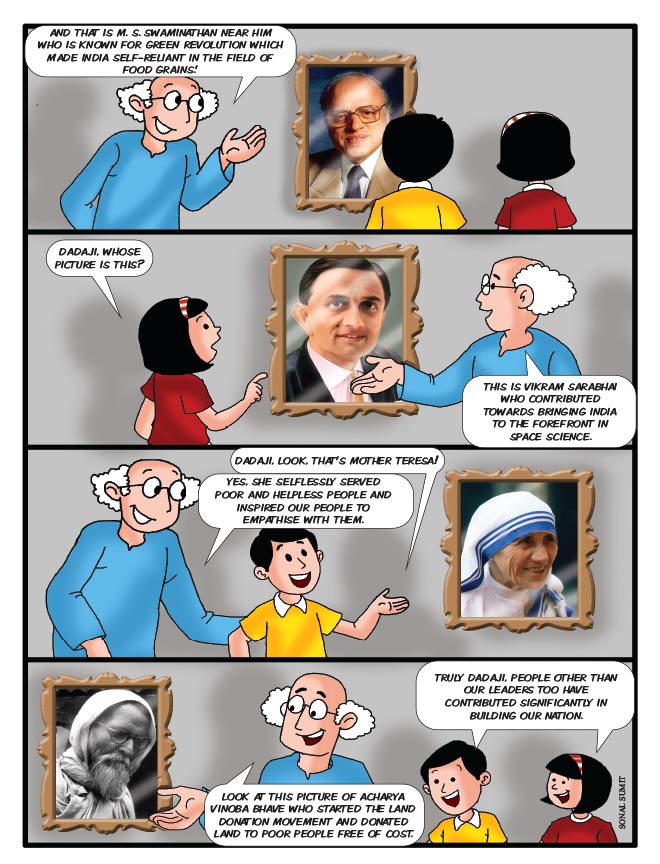
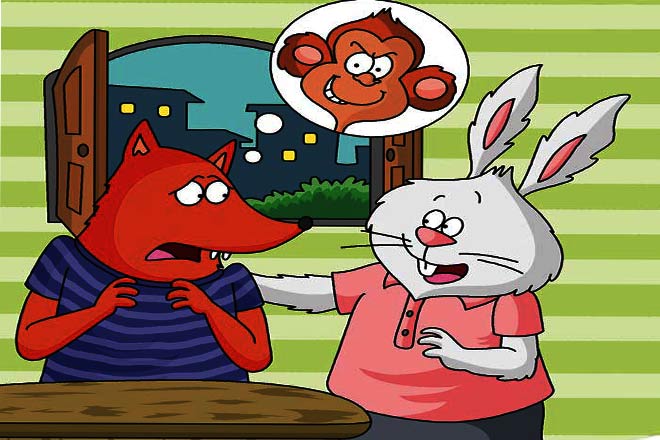
The Missing Money
One morning, Baddy fox and Laptu jackal approached Cheeku rabbit for help. Cheeku was known to be fair and impartial. So, they were confident that Cheeku would help solve their problem.
“Yesterday, Laptu made some extra money at our store because of the festive sale. He couldn’t deposit it in the bank as it was quite late in the evening by the time he closed the shop. So, he came to my house and gave me the money for safe-keeping. But this morning, the money was missing,” said Baddy worried.
“Don’t worry, Baddy. We will find your money. Now, think calmly and tell me what you did with the money once Laptu gave it to you,” said Cheeku.
“Laptu had put the money in a yellow cover, which he handed over to me. After counting it, I hid it inside the rice bin to keep it safe,” said Baddy.
“Was anybody else there when you counted the money or placed it inside the bin? Do you suspect anybody?” asked Cheeku.
“Yes, I suspect Jumpy monkey. He was the only one who saw Laptu handing over the money to me. He even walked by my house a couple of times when I was counting the money,” said Baddy.
“In that case, let’s go to Jumpy’s house and find out. Come with me,” said Cheeku.
The three of them reached Jumpy’s house and there, they saw Jumpy and Meeku mouse counting some money.
Jumpy was surprised to see the three of them. “Hello! What brings you all here so early in the day?”
Cheeku explained about Baddy’s missing money. “Baddy says that you are the only one, beside him and Laptu, who knows about the money. So he suspects that you could have taken it,” said Cheeku.
“That is absurd! I did not steal the money!” said a shocked Jumpy.
“In that case, where did you get this money from?” asked Laptu, pointing to the bundle of cash in Jumpy’s hands.
“Meeku and I earned this money by selling the bananas from our farm,” said Jumpy.
“Liar! There’s no way you could have made so much money by selling bananas!” accused Baddy angrily.
“Calm down, Baddy. I will find out who the liar is,” said Cheeku. “Now tell me, how many notes were there and of what denomination? Since you counted the notes before you put in inside, you may know.”
Baddy became uncomfortable with the question. “Errr… There were 50 50-rupee notes,” said Baddy.
Cheeku took the bundle of cash from Jumpy and said, “Looks like Jumpy has all 100-rupee notes. So I guess, this is not your money.”
“I remember well. We had 100-rupee notes, not 50-rupee notes,” said Laptu.
“Aha! Who is the liar now? There are a couple of 50-rupee notes as well,” said Jumpy.
“You have been caught, Baddy! Now out with the truth! Why were you trying to frame Jumpy? Did you really lose your money?” asked Cheeku.
“Tell the truth, or else we will complain to King Shersingh about you,” said Jumpy.
Baddy and Laptu became scared and immediately confessed.
“Please don’t tell Shersingh! I am sorry I lied. We didn’t lose our money. Yesterday, while on the way to the shop, Laptu overheard Meeku and Jumpy talking about the money they made. So, we came up with a plan to get the money from them by wrongly framing them,” said Baddy.
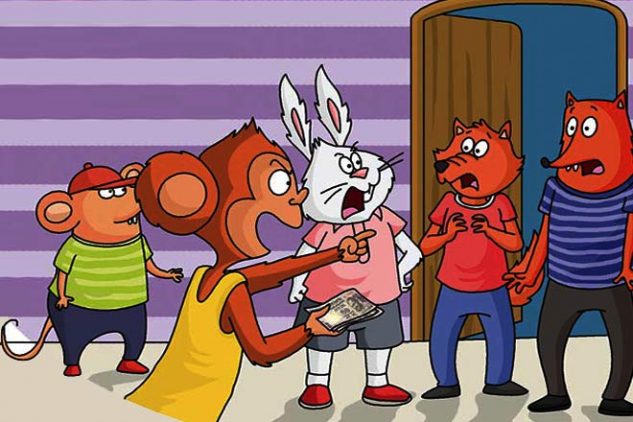
“Jumpy and Meeku made this money through hard work and not by cheating people. You should apologise to them,” said Cheeku.
Baddy and Laptu were ashamed of their behaviour. They apologised to Jumpy and Meeku for trying to cheat them.

Let’s Meet Ambedkar
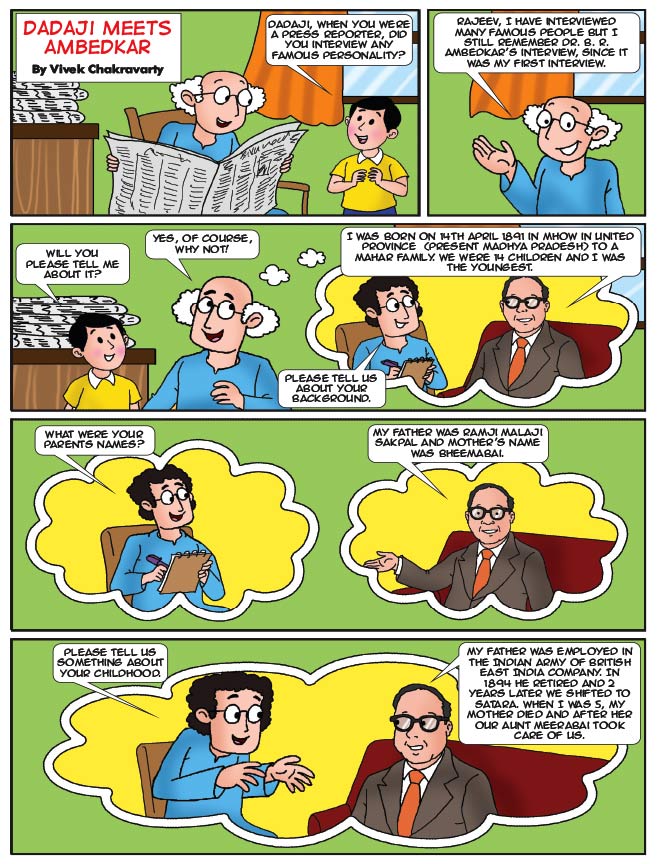
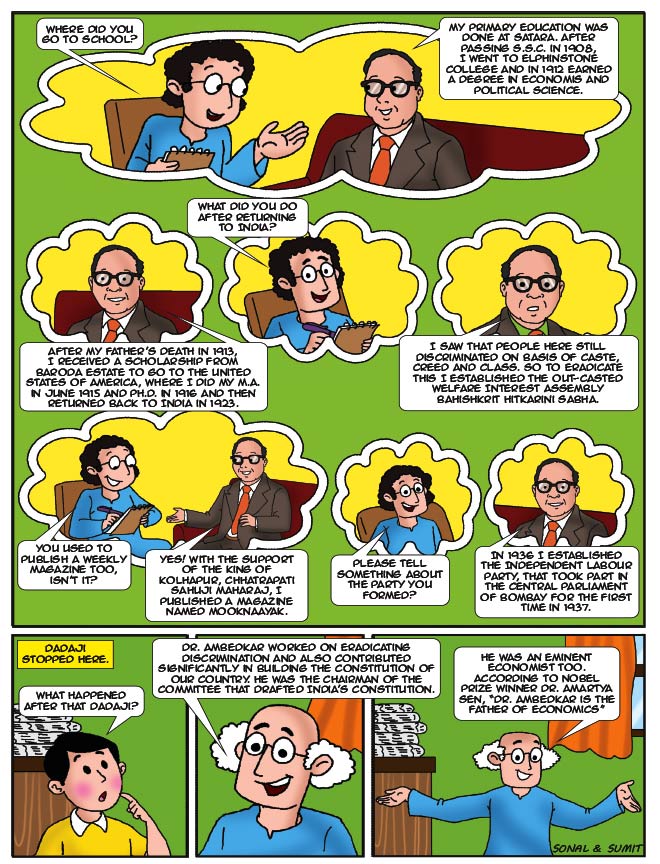

The Front-Bencher
One morning, during the early 1900s, in pre-independent India, two brothers were getting ready to go to school. They lived in the city of Cuttack, Orissa, along with their large family.
“Brother, it’s time to go to school. Let’s leave now,” said Subhas to his elder brother, Sharad.
“What’s the hurry? There’s still time,” responded Sharad casually.
“You don’t understand. I want to go to school early today because I want to sit on the first bench. I always end up sitting behind. I think it’s because I reach late,” explained Subhas.
“In that case, let’s leave right away!” said Sharad. The brothers left for school at once.
Subhas reached school earlier than usual and quickly occupied the front bench, which was still vacant. After a while, a British boy came to class and asked him to vacate the seat.
“I won’t get up from here. I came early today and was the first to sit here,” said Subhas.
The boy complained to the teacher who in turn asked Subhas to vacate the front bench. The teacher told Subhas that he was not allowed to sit there. Subhas felt dejected and moved to another bench at the back of the class.
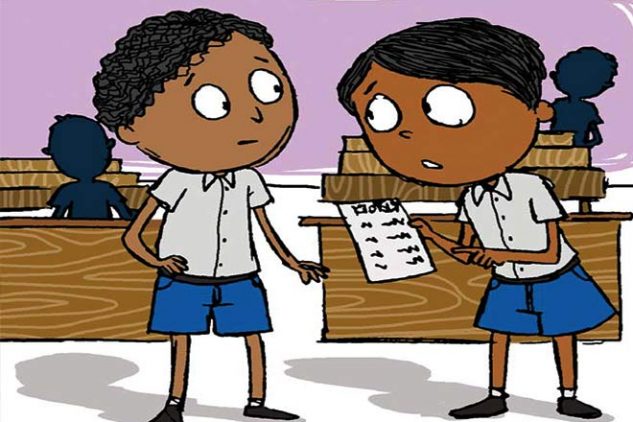
That evening, on their way back home, Subhas asked his brother, “Why aren’t we allowed to sit on the front benches?”
Sharad did not know how to explain to his little brother that under the British rule, this is how Indian students were treated in a missionary school.
Though Subhas was a bright student and scored the highest marks in his class, the scholarship was awarded to a British student. This again left Subhas heartbroken.
“We shouldn’t study in this school anymore. If they discriminate amongst students this way, is it a school worth studying in?” Subhas asked his brother.
Again, Sharad had no reply.
After a few years, Subhas passed the matriculation examinations with a good score and secured an admission into the Presidency College in Kolkata. His father, Janki Das who was a wellknown lawyer, and his mother, Prabhavati were overjoyed. They were certain that Subhas would make them proud.
One day, Subhas returned home from college quite upset.
“What’s the matter, Subhas? You look gloomy today,” said his mother, sensing something amiss.
“They expelled me from college,” said Subhas sadly.
“But why? You were specially invited to study in that college by the principal himself. Why would he do that?” asked his mother shocked.
“One of our professors, Mr. Otten holds discriminatory views about our country. So, when he said something disrespectful about India, and insulted some Indian students, I protested. And in the spur of the moment, I raised my hand, too. Therefore, they expelled me,” explained Subhas.
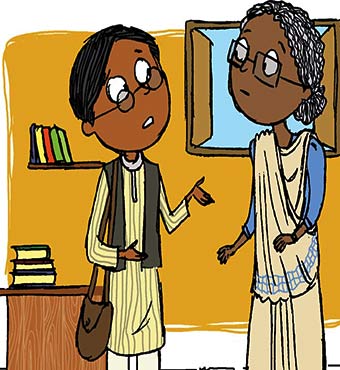
His mother was apprehensive for a moment, but then she smiled.
“Subhas, how could you have sat quietly and listened to insults against your own country? With regards to college decorum and discipline, what you did was wrong. But when seen from the point of view of upholding the respect of your country, you did the right thing. The notion of freedom runs in your veins. I am proud of you, son,” said his mother.
“Thank you, mother,” said Subhas, who felt much better now.
His mother hugged him and said, “Our country won’t be under the British rule for long because of people like you who stand up for their country.”
That boy grew up to be Netaji Subhas Chandra Bose, one of the most prominent freedom fighters of our country.
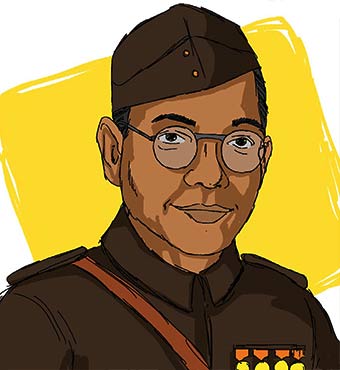
Subhas Chandra Bose set up the Azad Hind Fauj, an army he raised with the help of the German government to wage war against Britain. He was also the first person to address Mahatma Gandhi as the Father of the Nation in a speech delivered on 6 July 1944, through the Azad Hind Radio from Singapore.
His slogan, “Give me blood, and I shall give you freedom” went a long way in uniting the citizens of India against the British rule.



